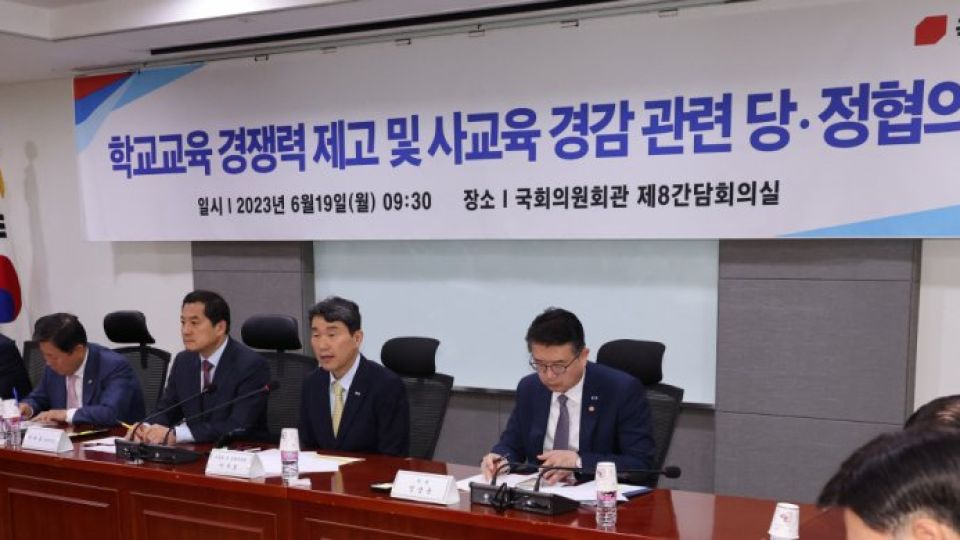June 21, 2023
SEOUL – South Korea’s state-administered college entrance exam, Suneung, will only cover materials taught in class from this year onward, excluding the so-called high-difficulty level “killer questions,” the government said Monday, sending a clear signal that it has started education sector reforms.
At the consultation meeting held between the government and the ruling People Power Party, Education Minister Lee Ju-ho said the killer questions, which often test high schoolers above their ability level, have been pushing students to resort to private education to score high marks.
“There were criticisms that expanding the scope of the exam had driven students to receive private education, and the ministry should reflect on neglecting such problems and being unable to solve them,” Lee said.
The changes would be applied to the September mock exam, as well as to the annual Suneung in November, President Yoon Suk Yeol’s office said on the same day.
While Suneung’s difficulty level varies each year, killer questions are usually worth the most points in the exam and tests students on materials not covered in class.
Later in the afternoon, the chief of the Korea Institute for Curriculum and Evaluation, the agency which oversees Suneung, offered to step down from office, amid rumors that the agency had skipped Yoon’s order to make changes to the test in March.
In a written statement, Lee Gue-min, the incumbent president, said that he has decided to resign as the head of the institution, taking the responsibility over failing to adjust the difficulty level of questions for the June mock test which Yoon and his education policymakers have reportedly instructed to do so months before.
“I’m sincerely sorry for causing trouble and inconvenience to all of the students and parents who have been preparing for Suneung all this time,” the statement read.
The Yoon administration sees bolstering public education as a way to quell the financial burden of private education on parents, to relieve students from the excessive preparation required for the test and to give equal education opportunities for all. The president was quoted as saying by his aide that he wants the test to stop “playing games” with students, according to the Yonhap News Agency.
Korea’s education system has long been criticized for driving students into excessive competition at a young age and for placing heavy financial burden on parents for their children to receive private education so that they could get good scores.
South Korea’s education fever led to spending a record-high 26 trillion won ($20.3 billion) on private education last year, with spending on English being the highest.
Against this backdrop, the government and the ruling party agreed to roll out a set of measures to reduce private education on June 27, citing that the country has seen a stark increase in private education spending.
Yoon’s policy agenda on one of the nation’s most sensitive issues started to emerge last week, but has sparked uncertainty and confusion, with education experts pointing out that students won’t be able to adjust to the changes as the annual test is only five months away. The opposition party also lashed out at Yoon’s drive, saying his approach is “unilateral” and that it is “inappropriate” for the president, who has no expertise in education, to intervene in the nation’s education system.
“The president’s remarks brought extreme confusion to students since he didn’t specify in terms of what he meant by ‘making Suneung easier’ by only including questions taught in class because the curriculum (in public schools) differ and teachers have different standards,” Kim Won-joong, who heads the college admissions strategy bureau at Kangnam Daesung Hagwon, told The Korea Herald.
“This year’s Suneung will be easier than the June mock exam and last year’s test since the Korea Institute for Curriculum and Evaluation, which oversees Suneung, will bear in mind to make the test slightly less difficult,” Kim added.
Woo Youn-cheol, who heads the Jinhak Educational Assessment Research Institute, echoed Kim’s views.
“The purpose of having ‘killer questions’ is to differentiate the levels of students in the top category, but if the test becomes less difficult, more students will flock to hagwon because there’s a chance for them to score well on easier questions,” Woo told The Korea Herald.
The Education Ministry, meanwhile, denied rumors that this year’s Suneung will be “made easier” through a written statement on Monday, explaining that the exam would be based on the guidelines announced in March.
Students and parents have also expressed their frustration regarding Yoon’s sudden and bold educational reforms.
“What we’re studying right now is heavily based on (what is studied in) hagwon, even if we go to public schools, and I’m confused about how to prepare for the test that could possibly decide the fate of my life,” Ha Yu-rim, a high school senior student in Ilsan, told The Korea Herald.
Lee Jung-a, a mother of a high-school senior, told The Korea Herald that making Suneung less difficult will only trigger spending on private education.
“The education reform will only benefit students in Daechi-dong since they have more access to test materials and can receive lessons from A-list tutors,” she said.


